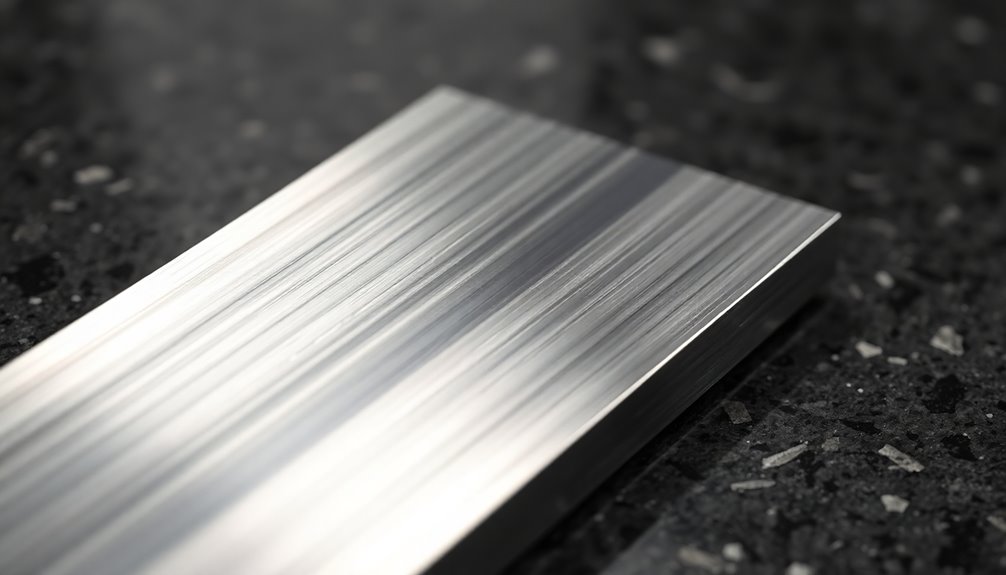When it comes to strong but light metals, aluminum, titanium, magnesium, and beryllium are your top choices. Aluminum is lightweight yet durable, making it ideal for various applications. Titanium stands out for its exceptional strength and corrosion resistance but can be pricey. If you're looking for the lightest option, magnesium fits the bill with easy machining. Beryllium, while expensive, offers superior strength for specialized tasks. Each metal has unique qualities tailored to specific needs. Depending on your project, one might suit you better than the others—stick around to uncover which metal will work best for your next venture!
Key Takeaways
- Aluminum is a popular choice, offering a density of 2.7 g/cm³ with excellent strength and corrosion resistance.
- Titanium, though more expensive, boasts exceptional strength and corrosion resistance with a density of 4.5 g/cm³.
- Magnesium is the lightest at 1.7 g/cm³, providing good machinability and a fair strength-to-weight ratio.
- Beryllium offers superior structural integrity and heat dissipation, ideal for specialized aerospace applications despite its high cost.
- When selecting materials, consider project requirements, as each metal has unique advantages and disadvantages tailored to specific uses.
Characteristics of Light Metals
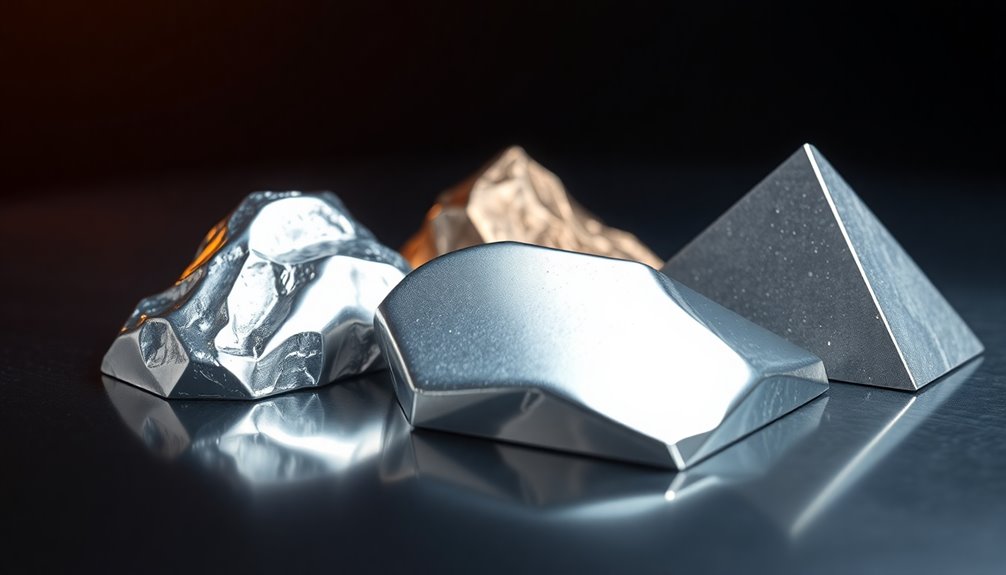
Light metals are known for their unique characteristics that set them apart from heavier alternatives.
First, their low density, typically up to 4.99 g/cm³, makes them significantly lighter than materials like steel, which has a density of about 7.8 g/cm³. This low density contributes to high strength-to-weight ratios, essential for applications demanding both strength and minimal weight. For example, aluminum and titanium excel in this area, outperforming heavier metals. Additionally, many light metals, particularly titanium, show remarkable corrosion resistance, making them suitable for harsh environments. Furthermore, the ability to form alloys enhances their performance for specific applications.
Lastly, machinability varies among these metals; aluminum is easy to machine, while titanium requires more specialized techniques.
These characteristics make light metals invaluable in various industries, from aerospace to automotive.
Top Lightweight Metals
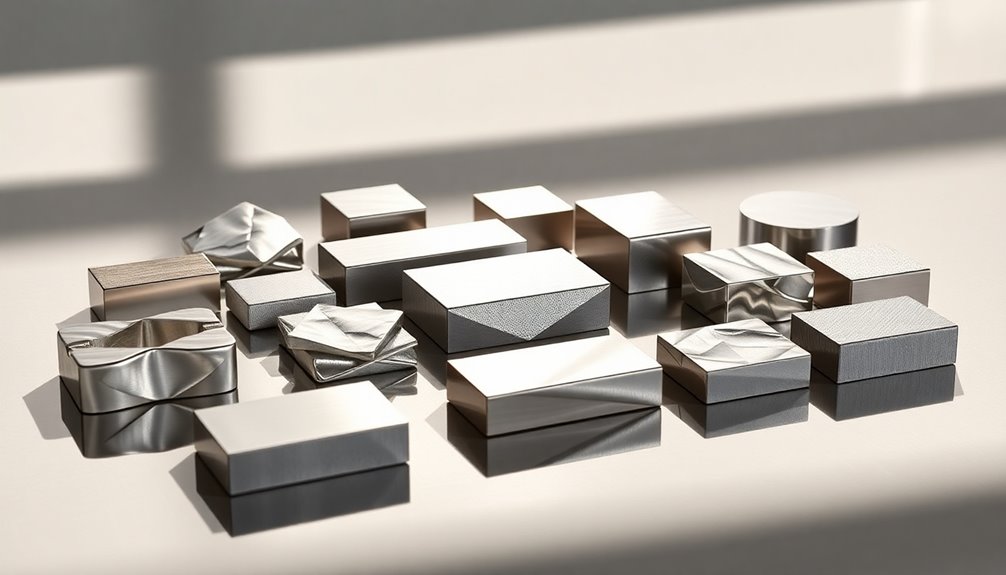
When it comes to selecting lightweight materials, several metals stand out for their impressive combination of strength and low density.
Aluminum, with a density of 2.7 g/cm³, offers a balanced strength-to-weight ratio and good corrosion resistance, making it a popular choice across various industries. Additionally, its high recyclability contributes to sustainability and reduced waste in production processes.
Titanium, denser at 4.5 g/cm³, shines with its exceptional strength and excellent corrosion resistance, though it comes at a higher cost.
Magnesium is the lightest option at 1.7 g/cm³, providing good machinability and a fair strength-to-weight ratio for budget-conscious projects.
Finally, beryllium, while costly, delivers excellent corrosion resistance and a strong performance for specialized applications.
Each of these metals brings unique benefits tailored to your specific needs.
Applications of Strong Lightweight Metals
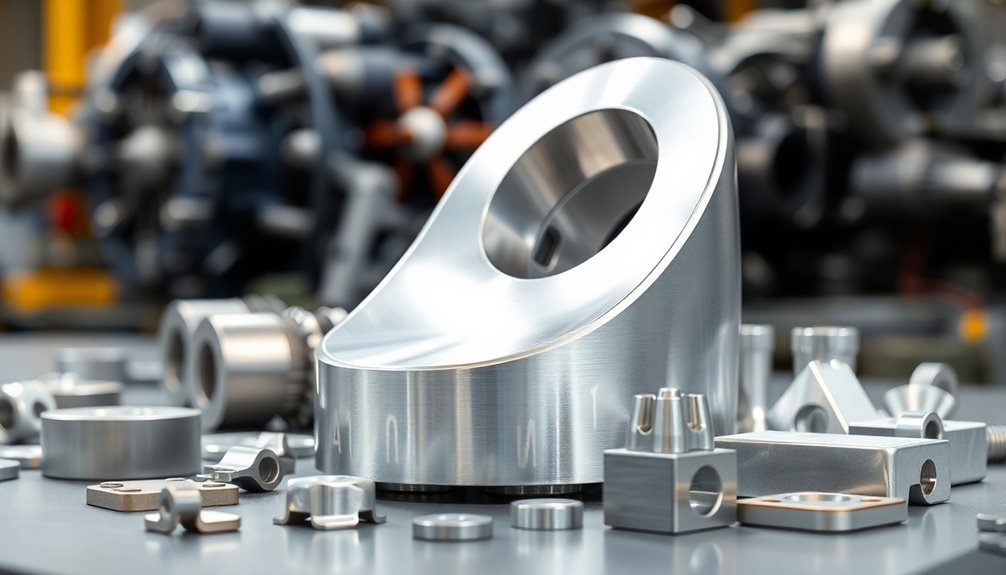
Strong lightweight metals have numerous applications across various industries, showcasing their versatility and performance.
In the automotive sector, magnesium alloys are popular for engine blocks, transmission cases, and wheels, enhancing fuel efficiency and performance. These alloys are 75% lighter than steel, making them an ideal choice for weight-sensitive applications.
The aerospace industry benefits from these metals too, using magnesium alloys for landing gear and structural components, while titanium alloys are preferred for their strength in jet engine parts.
In sports, magnesium alloys make bicycle frames and tennis rackets lighter and more durable, while titanium alloys improve the strength of golf clubs.
In the medical field, titanium alloys shine in implants and surgical instruments due to their biocompatibility, while magnesium alloys are explored for biodegradable medical devices.
These applications highlight the essential role of strong lightweight metals.
Advantages and Disadvantages
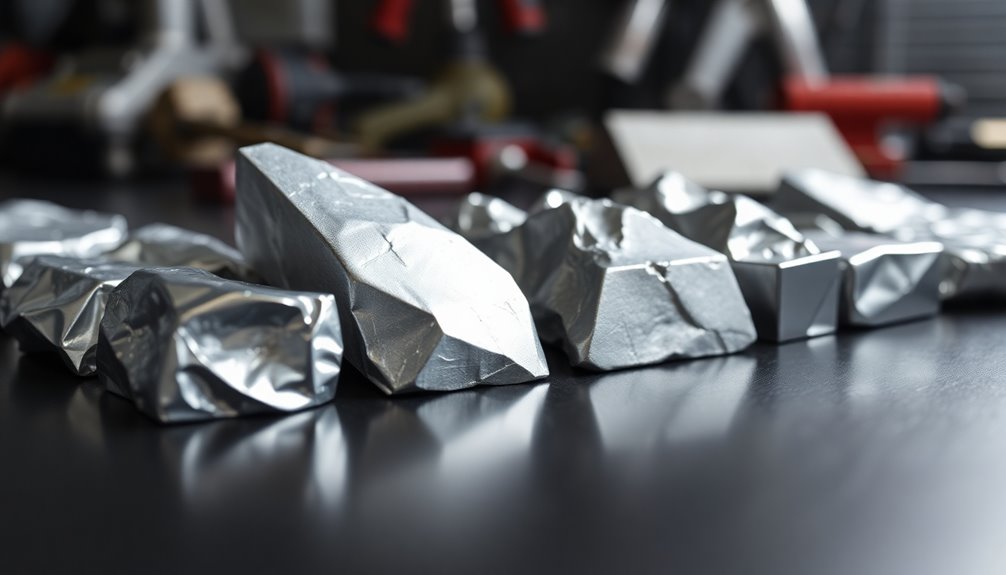
The versatility of strong lightweight metals comes with a mix of advantages and disadvantages that influence their selection for various applications.
On the plus side, metals like aluminum and titanium offer impressive strength-to-weight ratios, making them ideal for demanding tasks. Titanium's excellent corrosion resistance is a significant asset in harsh environments, while aluminum's high machinability allows for easy shaping. Additionally, aluminum is 90% recyclable, requiring only a fraction of the energy for production compared to other metals.
However, these materials also have drawbacks. Magnesium, for instance, is prone to corrosion and has lower fatigue resistance. Titanium, although strong and corrosion-resistant, can be expensive and challenging to work with. Aluminum, while cost-effective, may not perform well under high temperatures compared to titanium.
Balancing these factors is essential when choosing the right metal for your project.
Selecting the Right Material
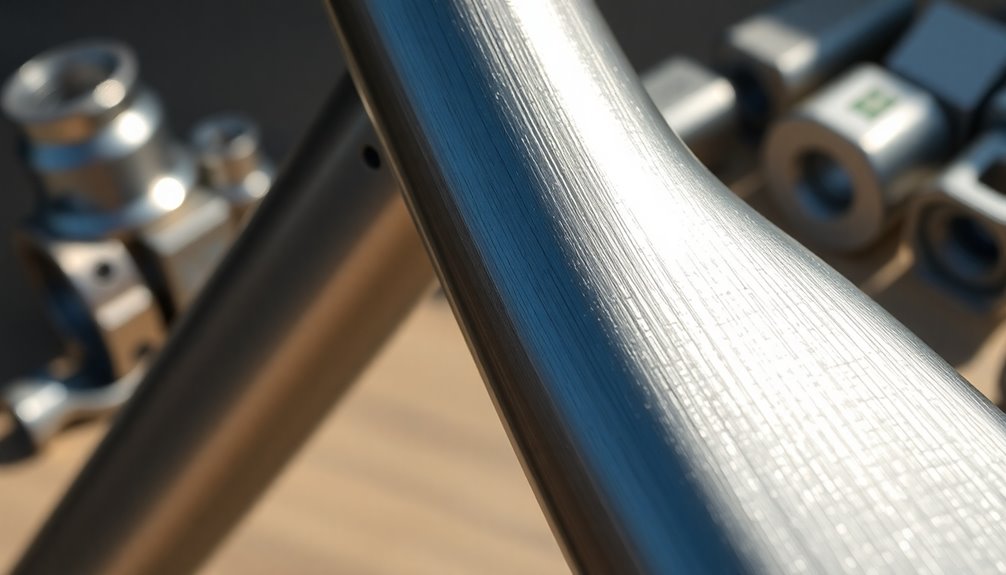
Choosing the right material for your project can significantly impact its performance and longevity.
Aluminum is an excellent choice if you need a lightweight metal with high strength and corrosion resistance. For applications requiring easy machining and biocompatibility, consider magnesium.
If extreme strength and resistance to harsh environments are essential, titanium stands out, offering impressive thermal properties. High strength-to-weight ratios are crucial for optimizing the design and efficiency of aerospace components.
Beryllium, while toxic, provides superior structural integrity and heat dissipation, making it ideal for aerospace applications.
Evaluate the specific requirements of your project—like weight, strength, and environmental conditions—to select the most suitable metal.
Each option has its unique advantages, so understanding these traits will ensure your project's success.
Frequently Asked Questions
How Do Light Metals Compare in Terms of Cost?
When you compare light metals, aluminum is the most cost-effective, priced at about $0.072 per ounce, while titanium is significantly more expensive at $0.56 per ounce.
Magnesium generally offers a lower cost than both, making it appealing for lightweight applications.
Beryllium, however, is the most expensive at $92.49 per ounce, limiting its use.
Each metal’s cost reflects its production and application suitability, so consider your specific needs when making a choice. Some metals, like aluminum and stainless steel, offer durability and resistance to corrosion, making them ideal for outdoor applications, while others, such as copper, provide excellent conductivity for electrical systems. When selecting materials for projects, it’s essential to weigh both performance and budget, as these factors contribute to why contemporary homes cost so much. Ultimately, understanding the balance between quality and cost will help you make informed decisions that align with your project’s goals.
What Are the Recycling Options for Lightweight Metals?
Recycling lightweight metals is like turning yesterday's treasures into today's innovations. You can get involved by recycling aluminum, titanium, copper, and magnesium.
For aluminum, community drop-offs are your best bet. Titanium needs specialized processes, while copper and magnesium offer straightforward melting and refining.
Each method not only conserves energy but also reduces waste. By participating, you're not just recycling; you're contributing to a more sustainable future, one lightweight metal at a time.
How Do Temperature Changes Affect Metal Properties?
Temperature changes significantly affect metal properties.
When temperatures rise, metals expand, which can lead to structural issues if not properly accounted for. As you heat them, electrical resistance increases due to the heightened kinetic energy of electrons.
You'll also notice that mechanical properties like hardness and strength can change, often making metals more brittle or tougher, depending on the temperature.
Understanding these effects helps you choose the right materials for your projects.
Can Lightweight Metals Be Easily Welded or Joined?
You'll find that lightweight metals can be easily welded or joined, but it often depends on the specific metal and welding technique you choose.
MIG and TIG welding are popular for their control over heat input, which helps prevent distortion.
Spot welding is efficient for thin sheets, while advanced methods like laser and ultrasonic welding offer precision.
Always consider the properties of the metal and the equipment you're using for the best results.
What Advancements Are Being Made in Lightweight Metal Technology?
You'll find exciting advancements in lightweight metal technology.
High-strength lightweight alloys like titanium, magnesium, and aluminum are being developed for better performance.
Techniques such as 3D printing let you create complex designs with minimal material waste.
Advanced manufacturing methods, including the incorporation of nanoparticles, enhance strength without adding weight.
Plus, automation and robotics are streamlining production processes, making it easier to achieve high-quality lightweight components efficiently and effectively.
Conclusion
In a world where every ounce counts, choosing the right lightweight metal is like finding the perfect feather for your dream pillow—essential for comfort and strength. You've explored the shimmering options, from aluminum to titanium, each with its own unique flair. As you navigate your projects, let these strong yet light metals be your guiding stars, illuminating the path toward innovation and efficiency. Remember, the right material doesn't just lift burdens; it elevates your vision.
